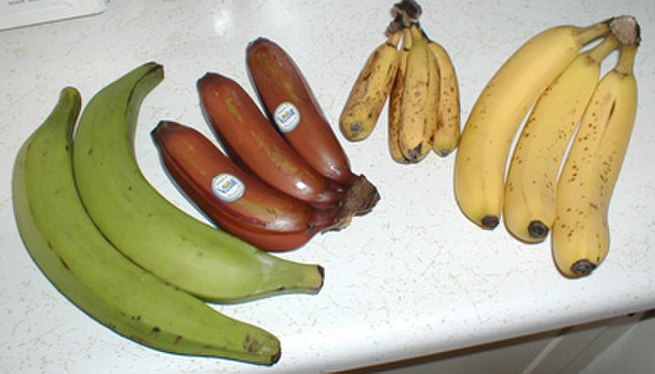
Main Difference
The main difference between Banana and Bannana is that the Banana is a fruit and Bannana is a genus of arachnids.
-
Banana
A banana is an edible fruit – botanically a berry – produced by several kinds of large herbaceous flowering plants in the genus Musa. In some countries, bananas used for cooking may be called “plantains”, distinguishing them from dessert bananas. The fruit is variable in size, color, and firmness, but is usually elongated and curved, with soft flesh rich in starch covered with a rind, which may be green, yellow, red, purple, or brown when ripe. The fruits grow in clusters hanging from the top of the plant. Almost all modern edible seedless (parthenocarp) bananas come from two wild species – Musa acuminata and Musa balbisiana. The scientific names of most cultivated bananas are Musa acuminata, Musa balbisiana, and Musa × paradisiaca for the hybrid Musa acuminata × M. balbisiana, depending on their genomic constitution. The old scientific name Musa sapientum is no longer used.
Musa species are native to tropical Indomalaya and Australia, and are likely to have been first domesticated in Papua New Guinea. They are grown in 135 countries, primarily for their fruit, and to a lesser extent to make fiber, banana wine, and banana beer and as ornamental plants. The world’s largest producers of bananas in 2016 were India and China, which together accounted for 28% of total production.
Worldwide, there is no sharp distinction between “bananas” and “plantains”. Especially in the Americas and Europe, “banana” usually refers to soft, sweet, dessert bananas, particularly those of the Cavendish group, which are the main exports from banana-growing countries. By contrast, Musa cultivars with firmer, starchier fruit are called “plantains”. In other regions, such as Southeast Asia, many more kinds of banana are grown and eaten, so the binary distinction is not useful and is not made in local languages.
The term “banana” is also used as the common name for the plants that produce the fruit. This can extend to other members of the genus Musa, such as the scarlet banana (Musa coccinea), the pink banana (Musa velutina), and the Fe’i bananas. It can also refer to members of the genus Ensete, such as the snow banana (Ensete glaucum) and the economically important false banana (Ensete ventricosum). Both genera are in the banana family, Musaceae.
-
Bannana
Bannana is a genus of goblin spiders (family Oonopidae) native to Xishuangbanna prefecture, Yunnan Province, China, where it lives in the leaf-litter of tropical rainforest. There are two known species: Bannana crassispina and B. parvula, both described in 2015. Individuals are pale yellow and unpatterned, and range from around 1.0 to 1.8 mm in body length, with females being slightly larger than males. The eyes are reduced or entirely absent. Known only from a nature reserve in Xishuangbanna, Bannana belongs to a group of Asian goblin spiders known as the “Dysderoides complex”, that ranges from China to Pakistan and south to Indonesia.
-
Banana (noun)
An elongated curved tropical fruit that grows in bunches and has a creamy flesh and a smooth skin.
-
Banana (noun)
The tropical tree-like plant which bears clusters of bananas. The plant, usually of the genus Musa but sometimes also including plants from Ensete, has large, elongated leaves and is related to the plantain.
-
Banana (noun)
A yellow colour, like that of a banana’s skin.
“Pantone}} banana|FFBD4F”
-
Banana (noun)
A person of Asian descent, especially a Chinese American, who has assimilated into Western culture or married a Caucasian (from the “yellow” outside and “white” inside). Compare assimilated Hispanic or Black or Black person who is “black outside” and “white inside”.
-
Banana (noun)
A banana equivalent dose.
-
Banana (noun)
A catamorphism (from the use of banana brackets in the notation).
-
Banana (adjective)
Curved like a banana, especially of a ball in flight.
